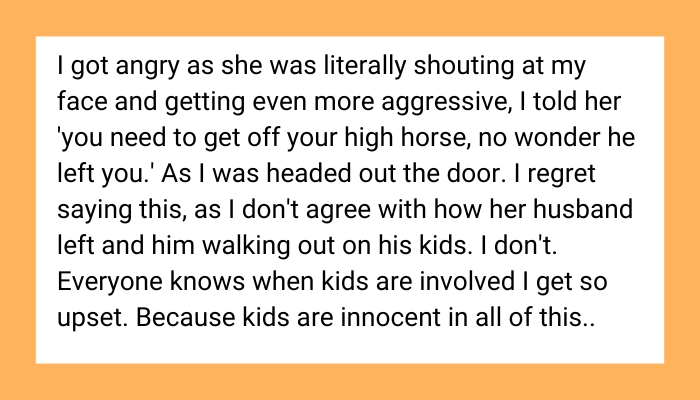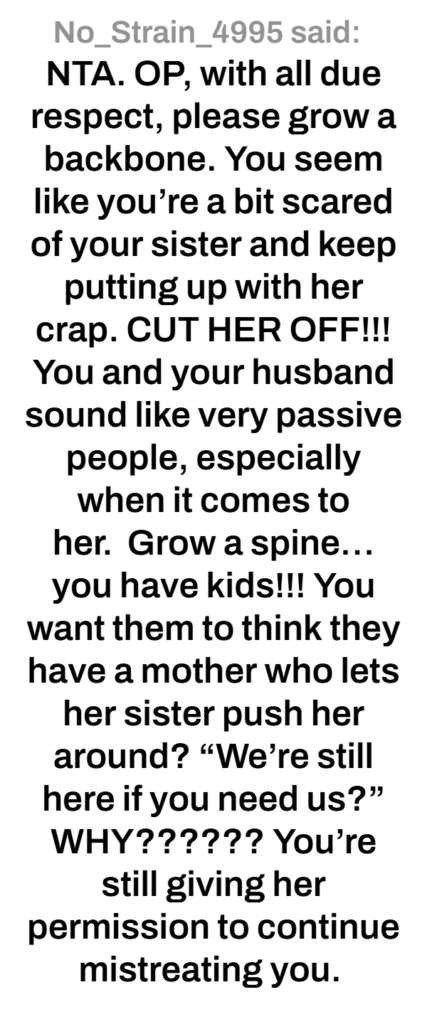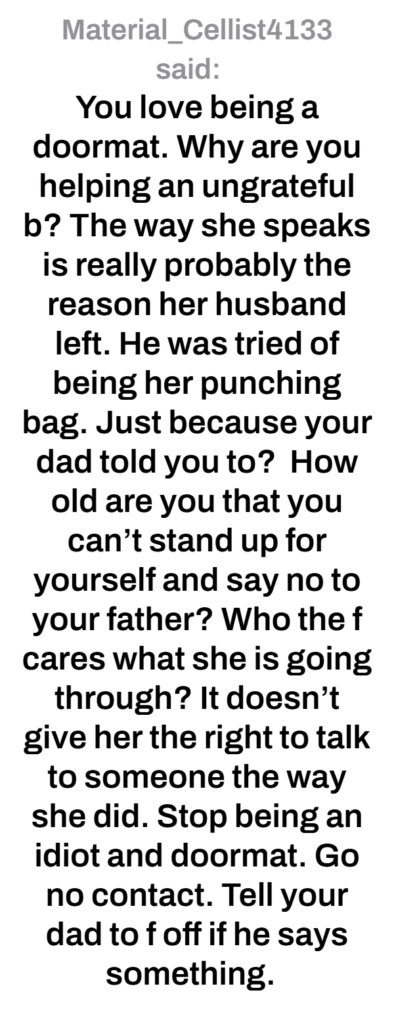AITA for telling my older sister that ‘no wonder your husband left you’

OP (26F) shares a fraught and emotionally charged experience involving her older sister (34F), with whom she’s had a lifelong strained relationship. Despite their rocky history, OP steps up to help her sister care for two young children—one of whom is an infant—while their father is away. Her sister’s husband abandoned the family at eight months pregnant, stealing valuables and leaving emotional wreckage behind. Despite this, OP and her husband (30M) travel three hours to help, offering time, effort, and support.
However, what begins as a tense but manageable week of caretaking devolves into cruelty. OP’s sister incessantly attacks OP’s weight, making disparaging remarks under the guise of “concern”—ignoring OP’s recent miscarriage, dismissing her feelings, and even minimizing her past trauma by cruelly denying that OP had been raped by a previous partner. The confrontation builds to a breaking point when, during a panic attack, OP’s sister storms into the room to escalate rather than de-escalate the situation. In a moment of emotional overload, OP retaliates with a cutting remark: “No wonder he left you.” Now, OP is left feeling guilty, worried about family fallout, and wondering if she crossed the line.
Advertisement – Continue Reading Below
Read for more info Reddit

































































1. Emotional and Verbal Abuse Patterns
What OP describes fits several patterns consistent with emotional abuse within dysfunctional families:
- Repeated targeted verbal attacks focusing on body shaming, which psychologists classify as a form of “appearance-based bullying” (Puhl et al., 2017, Journal of Adolescent Health).
- Gaslighting behavior when the sister denied OP’s sexual assault and tried to reframe OP’s trauma as lies.
- Attempts to isolate OP from her emotional support system (her husband), ensuring that toxic conversations only happen when he isn’t present.
Experts argue that repeated exposure to such dynamics within families can cause complex PTSD (C-PTSD), especially when combined with past trauma like sexual assault (Herman, 1992, Trauma and Recovery). OP’s panic attack and vomiting are severe physiological responses to being re-traumatized in a setting where she felt cornered.
2. Legal Boundaries & Harassment
While this is a familial setting, if this harassment were to happen in a workplace or other social context, OP’s sister’s behavior—specifically weight-related harassment, public humiliation, and mockery of sexual assault—could meet definitions of verbal harassment or emotional abuse under many workplace codes of conduct and domestic abuse statutes (depending on jurisdiction).
- UK Example: Under the Protection from Harassment Act 1997, repeated actions that cause alarm or distress—even in family settings—can potentially be considered harassment.
- US Example: Emotional abuse is harder to define legally unless it escalates, but constant personal attacks related to weight and trauma can be cited in cases involving family court or restraining orders if future safety is compromised.
While OP might not be ready for legal action, understanding that this wasn’t “normal sibling bickering” is crucial—it’s sustained psychological harm.
3. Power Imbalance & “Elder is Always Right” Mentality
Many traditional family structures operate under the concept that the elder sibling or parent is automatically correct, leading to power imbalances. This often silences younger family members, forcing them to tolerate abuse or disrespect. Studies in intergenerational family dynamics show that this belief system fosters narcissistic behavior in the elder sibling, who may assume their opinions are unchallengeable (Aronson, 2019, Family Process).
Advertisement – Continue Reading Below
OP’s dad enabling this behavior by advising her to “stay quiet” cements this toxic hierarchy. This places OP in a perpetual “child role” where her pain, experiences, or valid feelings get ignored or minimized.
4. Guilt Over the Final Comment – Is OP the AITA?
The final remark, “No wonder he left you,” is a reactive low blow—and OP acknowledges that. However, psychologists describe this as a “defensive counterattack” common in emotionally abusive situations, especially when someone has been cornered and repeatedly humiliated.
While not ideal, in the context of sustained provocation, OP’s outburst is understandable, if not commendable. Regret is natural, but this isolated moment does not outweigh the sister’s prolonged campaign of cruelty.
Advice & Recommendations
- Therapy/Counseling: Given OP’s past trauma, miscarriage, and the emotional abuse endured, speaking to a therapist is crucial for healing and building resilience against toxic family dynamics.
- Establishing Boundaries: It might be time to go low or no contact with the sister until she seeks help or acknowledges her behavior. Boundaries are not revenge—they’re protection.
- Prepare for Family Backlash: Dad may side with the sister. Writing down the sequence of events or sharing the incident with a neutral family member can help preserve OP’s side of the story if “flying monkeys” are sent her way.
- Marital Teamwork: OP’s husband did a great job supporting her. Continue fostering that strong “us vs. the problem” mindset.
Here’s what top commenters had to say about this one:




FIRST UPDATE:












































Here’s what top commenters had to say about the first update:



SECOND UPDATE:












OP was verbally abused, gaslit, and humiliated while trying to help. Her final comment was regrettable but came from deep emotional pain. Her sister weaponized trauma, mocked her miscarriage and rape, and acted violently. The fallout isn’t OP’s fault—it’s the result of years of toxicity boiling over.






